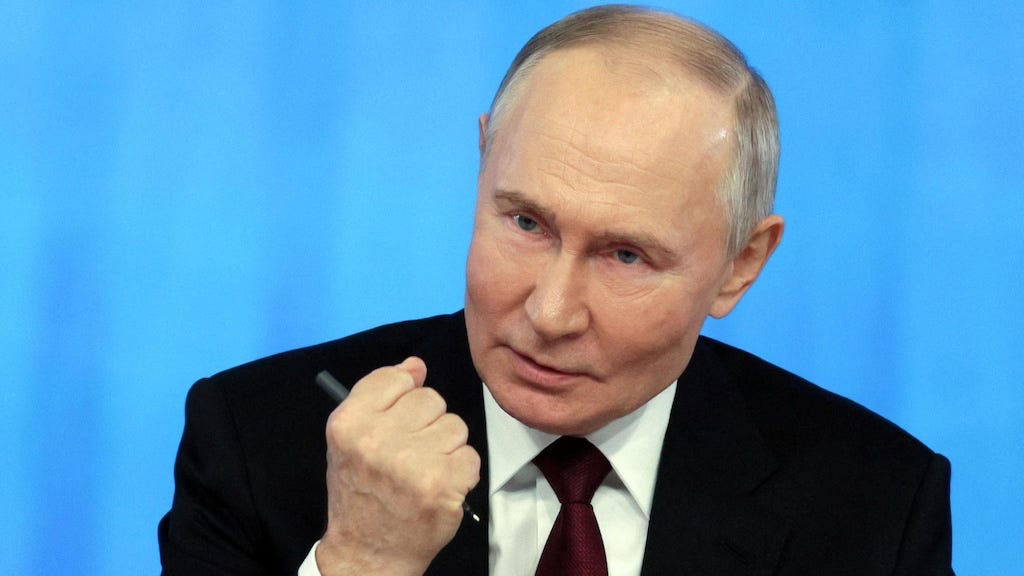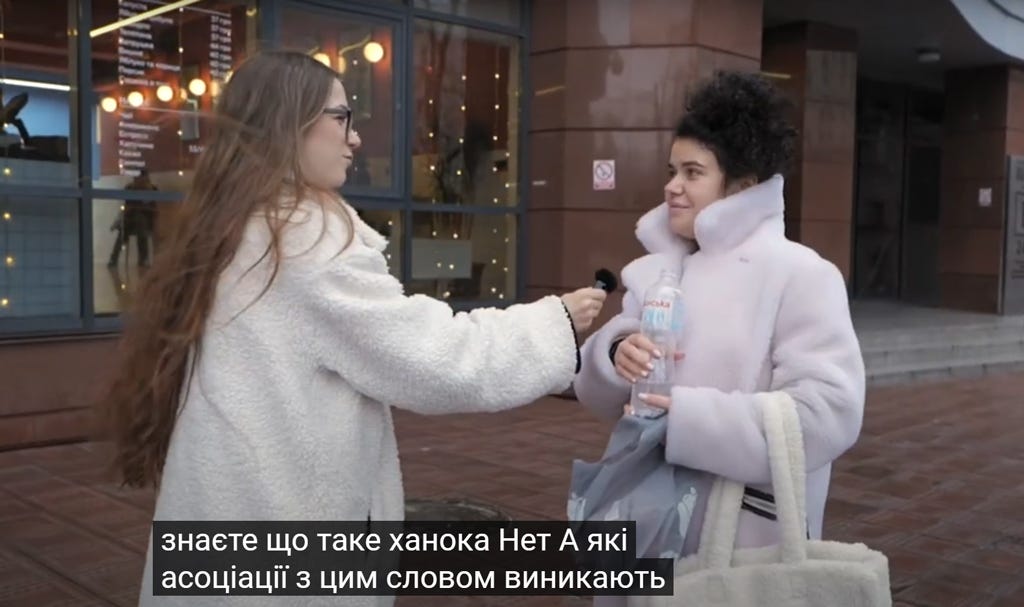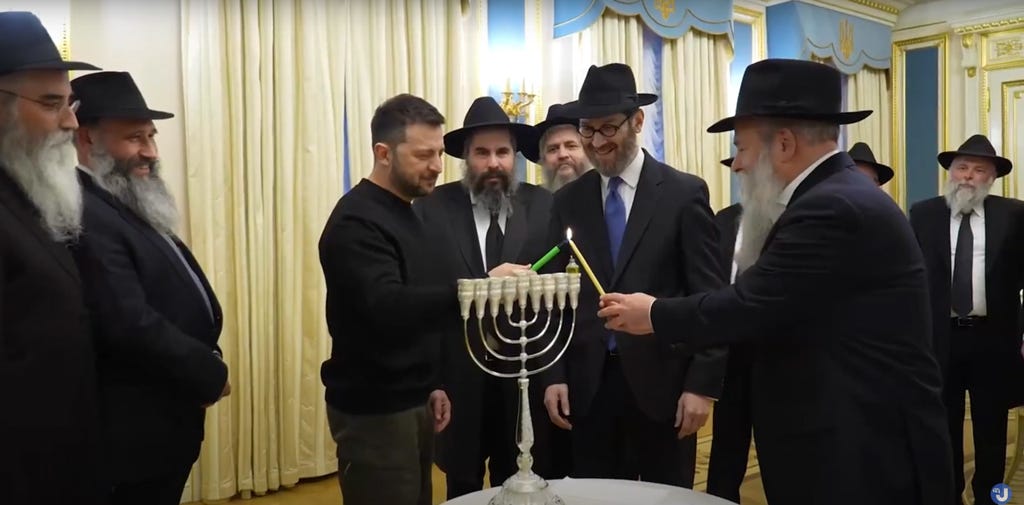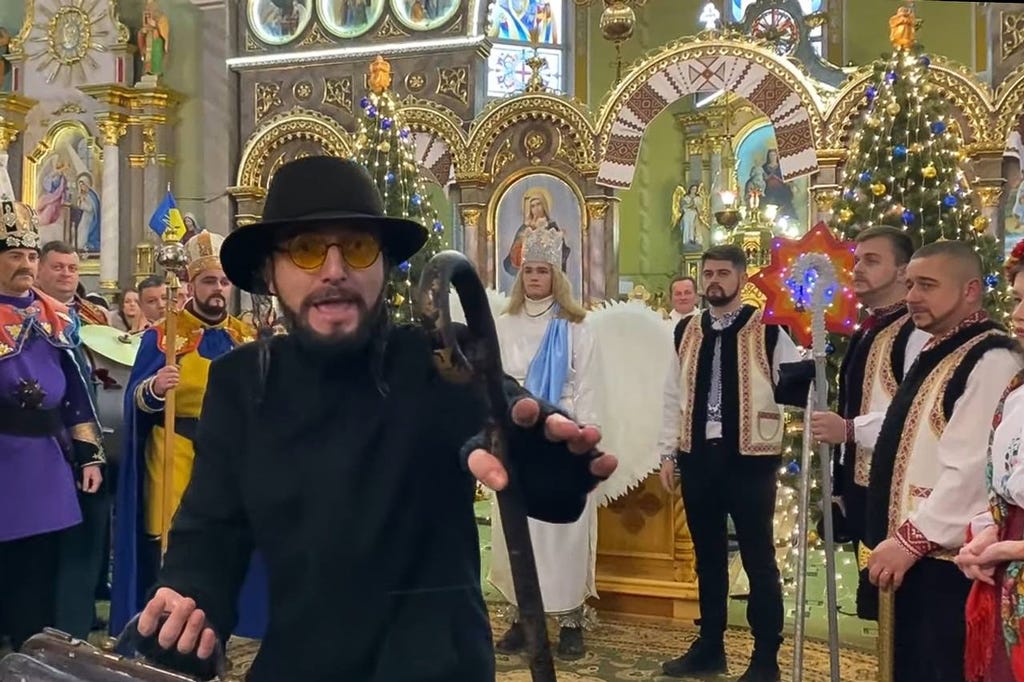The War in Ukraine: Jewish News #37
In this issue: Putin’s antisemitic outburst, Chanukah in Kyiv, and Taking the “zhid” out of Christmas
Putin’s Antisemitic Outburst: An Analysis
In his marathon end of year press conference (4.5 hours long!), Russian President Vladimir Putin took a question about the closure of the Russian Orthodox Church in Ukraine and used it to give a short antisemitic diatribe. Putin’s use of anti-Jewish tropes provides a window not so much into his mind as into his propaganda strategy at this stage of the war.
The question came from a representative of “A Different Ukraine”, a puppet movement headed by the Kremlin’s former man in Ukraine, oligarch Viktor Medvedchuk - who now lives in Moscow. It was straightforward and probably planted. “In Ukraine, the Russian Orthodox Church is not merely under attack; it is virtually expelled. What is your stance on this matter?”
Here is Putin’s reply, as translated by the Kremlin website (with my added emphases):
“What is happening with regard to the Russian Orthodox Church
in Ukraine is a unique situation. This is a gross, blatant violation of human rights, the rights of believers. The church is being torn apart right before everyone’s eyes. This is like execution by firing squad, and yet the world seems to ignore it.
I think those who engage in such actions will get it back. […] These people are not even atheists. Atheists are individuals who believe in the idea that there is no God, but this is their faith, their convictions and worldview.
But these are not atheists; they are people without any faith at all. They are ethnic Jews, but who has ever seen them in a synagogue? They are not Orthodox Christians either, since they do not attend churches. And they certainly are not followers of Islam, as they are unlikely to be seen in a mosque.
These are individuals without kith or kin (in the original: без роду, без племени DEF). They do not care about anything that is dear to us and the overwhelming majority of the Ukrainian people. Eventually, they will run away someday and go to the beach rather than to church. […]
I believe that someday the people in Ukraine, and the majority of Ukrainians are still connected to Orthodoxy, will evaluate their actions accordingly.”
Let’s paraphrase what is being said here: Ukraine is ruled by Godless Jews. They are different than us, and don’t care about things that are dear to us, Russians and Ukrainians, such as the Orthodox church. Eventually the Ukrainian people will awaken, realize this, and eject them from power.
The red flag in this quote is the reference to those people as “без роду”, without a clan, which is an eerie echo of безродные космополиты “rootless cosmopolitans”, a phrase which was used as a euphemism for treacherous Jews during the final years of Joseph Stalin. “Bez rodu” is not a common Russian expression. It has only one association – Jews.
The phrase “they are ethnic Jews” also stands out because Zelensky is actually the only full-fledged Jew in the upper echelons of the Ukrainian government. Prime Minister Denys Shmyhal and Foreign Minister Andrii Sybiha have no Jewish roots. Defense Minister Rustem Umerov is a Crimean Tatar (and Muslim), and Commander in Chief of the Armed Forces Oleksandr Syrskyi is ethnically Russian. The only person who can be squeezed into this “they” is Andriy Yermak, the head of the Presidential Administration, whose father is Jewish - and whose mother is Russian. Putin is clearly trying to spread an myth that the Jews are persecuting the Orthodox church.
The reference to these Jews Godlessness on the eve of the Christmas season is intended to highlight their utter foreignness, and the danger of their nihilism. Since these ethnic Jews have no belief system or value system, they can commit any crime. (The same distinction was made by the authorities in late Tsarist Russia: religious Jews were loyal and obedient; Godless Jews were violent revolutionaries.)
This linking of Zelensky’s Jewishness with his frightening alienness and monstrous criminality is not new. It has been used by the Russian authorities from time to time. Perhaps the most overt case was the statement by Russian Foreign Ministry Spokesperson Maria Zakharova in December 2022:
“Zelensky doesn’t care about his own people. Only in public does he call himself a citizen of Ukraine. Only in public does he wear a Vishevanka [the traditional Ukrainian shirt], only in public does he perform certain ritual acts in cathedrals. In reality, he doesn’t belong to the culture and spirituality of this country and of this people. We fully understand that, based on the merciless criminal acts that he perpetrates.”
This is an antisemitic dog-whistle, if there ever was one.
The assertion that Jews rule Ukraine and are destroying it, spiritually and physically, is an alternative to the primary Kremlin narrative that Ukraine is ruled by a clan of Neo-Nazis. In the primary narrative, Zelensky is a bad Jew who has betrayed his people by becoming a servant to Ukrainian Nazis. (Remember when Putin said that Zelensky is “not a Jew, but a disgrace to the Jewish people”? That’s what he meant.) But in this alternate narrative, Zelensky hasn’t betrayed his Jewishness; indeed his Jewish essence is the key to understanding his evil deeds, such as murdering the Russian Orthodox church. It is, in other words, antisemitic to the core.
Putin’s message was directed at a specific constituency: the Russian nationalist right, made up largely of imperialists and Orthodox monarchists (think Alexandr Dugin and Konstantin Malofeev). At this stage, they are the only Russian constituency that enthusiastically supports the war against Ukraine. They are fiercely anti-Ukrainian and viscerally antisemitic. For them, Jewish Satans in charge of Ukraine is a much more powerful image than neo-Nazis. (Many of these monarchists have sympathies toward Nazism.) At his December 19 news conference, Putin decided to throw some red meat to these supporters, as a kind of Christmas present, with his charge that ethnic Jews were destroying the Orthodox church.
How much more of this antisemitic venom the Kremlin will release in future months remains to be seen.
Chanukah in Kyiv
The well-known Ukrainian pop-duo “Alibi” resurfaced a few years ago as a Yiddish musical group called “The Abili Sisters”. (See newsletter #19, March 2024.) This week, the sisters – in real life, their names are Anna and Angelina Zavalsky - released a Ukrainian-language Chanukah song, probably the first such song in a century. It is a Ukrainian translation of Woodie Guthrie’s “Honeyky Hanukah” originally performed by the Klezmatics. The music video was filmed on the streets of Kyiv. It concludes with a brief explanation of the holiday and wishes that light defeat darkness.
The “Jewish Podcast”, a Ukrainian-language weekly Youtube show hosted by Inna Tsaruk (with 3,000 subscribers) has some of the most original Jewish content in Ukraine. In a recent episode, Tsaruk stopped people on the streets of Kyiv and asked them if they knew what Chanukah was. Of the eight people questioned, one knew that it was a Jewish holiday, one knew it was something Jewish, and one said it was a Japanese word. The rest had no idea what Chanukah was. When Tsaruk explained, no one responded negatively. Tsaruk concluded her short episode by remarking: “It’s OK not to know. It’s not OK not to want to know new information.” And she offered viewers to watch her videos or contact her by Instagram to learn more about things Jewish.
A few days later, Tsaruk appeared on the morning show of Kyiv 24 Television to explain various aspects of the holiday: what is a shamash, why Jews eat latkes, what is chanukah gelt etc. Tsaruk likened the story of Chanukah to that of Ukraine in our time. Israel was under foreign occupation, the Jews’ culture and language were banned, their holy places destroyed, but with God’s help the smaller army defeated a great empire. The TV host answered “Amen”.
In what is now a tradition, President Zelensky received a group of 9 Chabad rabbis (and one Karlin-Stolin rabbi) from across Ukraine to light the first Chanukah candle. In a video of the event released by the President’s office, Zelensky offered impromptu remarks: “Today we celebrate both Christmas and Chanukah. And it’s very good that in Ukraine, we can all live together and fight darkness together, as Rabbi Kaminestky [of Dnipro] said. [..] As Chanukah teaches, light will definitely defeat darkness. I am sure of that. There will be a just peace for all our country, for all our children. I wish you, your families, and relatives - a happy holiday!” Then turning to Chief Rabbi Moshe Asman, who lost a son in the war against Russia this past summer, he added: “We remember all those who are not with us. My condolences. His light definitely lives on in our memory.” Zelensky also mentioned that he was lighting the Menorah that President Javier Milei of Argentina gave him at the latter’s inauguration.
A public Chanukah lighting ceremony took place in Kyiv’s Independence Square (Maidan Nezalezhnosti), in the presence of Mayor Vitaly Klitchko, and Israeli Ambassador Mikhael Brodsky. The event was organized by the Federation of Jewish Communities of Ukraine, which was represented by its Executive Chairman, Rabbi Raphael Rutman. Press articles claimed that the “Maidan-Menorah” was the tallest in all of Europe. I have my doubts about that... But it was unique in other respects. The candelabra was made of shell casings brought back from the war-front, and the base of the menorah consisted of a Russian rocket fragment that landed on the territory of a Jewish school in Kyiv. The candles were lit by Tamir Elboim, a religious Jew who is a military instructor in the Ukrainian Armed Services. (On Tamir, see Newsletter no. 15, February 2024).
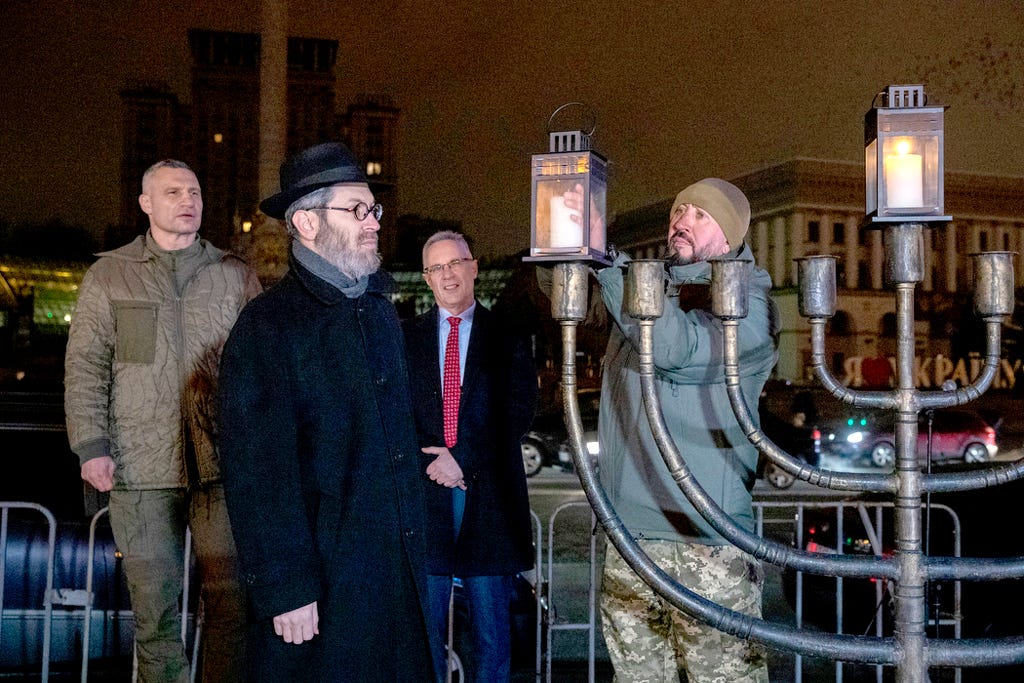
Taking the Zhid out of Christmas
As this newsletter has pointed out (Number 16, February 2024), antisemitic attitudes are lower in Ukraine than in any other east European country, and have been falling in recent years. But there is one sphere of Ukrainian culture where the negative image of the Jew persists – in the Christmas folk-play known as Vertep. The Vertep, which dates back to the 13th century, is a kind of Christian Purim-shpil. The cast of characters is set, but the dialogue and details vary from place to place. The characters are Joseph, Mary, Jesus, three king, angels, and three negative figures – Emperor Herod (with his soldiers), Death, and the Jew (called zhid). Sometimes a Roma (Gypsy) is added in. The zhid, as explained in a recent Ukrainian newspaper article “is a comical character who accompanies Herod. His role is to trick the public to give him tasty things. He cares only about material profit. He symbolizes deception and unscrupulousness. A skilled manipulator. Sometimes the zhid’s wife accompanies him.” In most plays their names are Moshko and Sarah.
In many Vertep plays, characters are “updated” – Herod and his soldiers can become Putin and the Russian army – but the zhid always remains a Jew. He can be a tavern-keeper, a merchant, a banker or a businessman, but he is always a Jew. A few years ago, the character was used to portray Ukrainian Jewish oligarch Igor Kolomoisky. (Now, Kolomoisky is in prison and out of public view.) In most plays, the zhid wears a black hat, a beard and/or peyos (side curls). To this day, Verteps are performed in schools and universities, thereby perpetuating negative stereotypes among young people who have never met a Jew, let alone an Orthodox Jew.
In recent years, a public debate has arisen on the issue. The Ukrainian Catholic University in Lviv pioneered by issuing a powerful statement in 2011 calling for the removal of the zhid from Verteps. It called for Christian love toward Jewish brethren, and reminded its readers that Jesus, Mary and Joseph were themselves Jews. Ukrainian Jewish organizations across the spectrum chimed in afterwards, after the Ukrainian Catholic University spoke out.
Defenders of retaining the zhid character usually refer to it as a folk tradition, one that isn’t really harmful, and that is part of the humorous playfulness of the Vertep-genre.
In 2021, the Ukrainian Service of Radio Liberty published an influential on-line article citing several voices critical of this “tradition”: Historian Yaroslav Hrytsak, Greek Catholic Father Yurii Schurko, and human rights activist Vyachislav Likhachev. (The article was reprinted by the Ukrainian religious news agency.) Later, historian Marta Havryshko offered an empirical study of Verteps with a reasoned call to remove the zhid. After the Russian invasion in 2022, authors noted that it was doubly insulting to mock Jews when Jewish soldiers were fighting and dying in the Ukrainian Armed Services, and when Israel was providing Ukraine with humanitarian aid. Nowadays, as one observer has noted, debates about the Vertep zhid have themselves become a tradition that is part of the Christmas-season. I should add that none of the above-mentioned indictments of the Vertep-zhid were written by Jews.
One would think that with a Jewish president who saved the country from destruction, Ukraine’s tradition of portraying the Jew as greedy and ridiculous would wither away. But it hasn’t. I suspect that it will take public declarations by the Ukrainian Orthodox Church and Greek-Catholic Church to change public opinions and practices. Why the churches haven’t intervened, I really don’t know.


